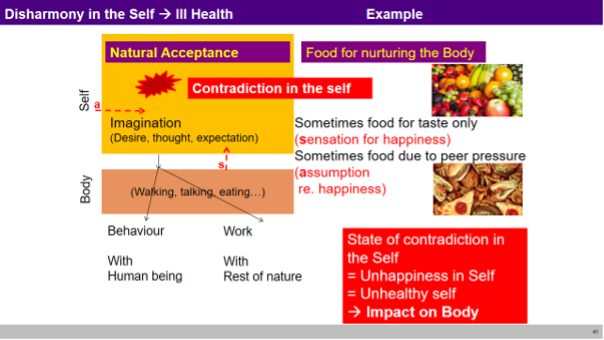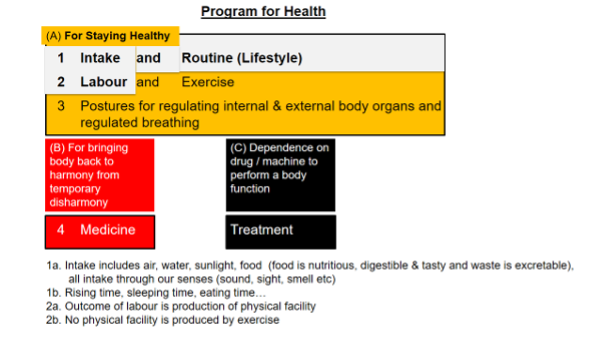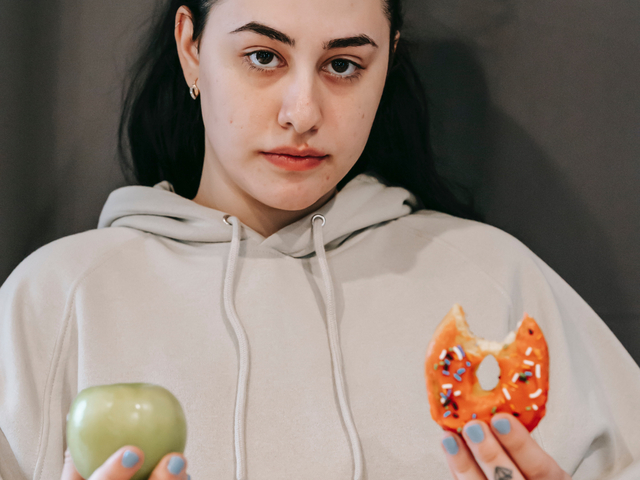Since the human being is a co-existence of Self (I) and body, when we consider the health of the human being, we need to consider both –
The health of the Self + The health of the Body
What do we mean by the Health of the Self?
How would you know if you are a healthy or an unhealthy Self? and
What are the consequences of being a healthy or an unhealthy Self?
Let’s find out.
A healthy Self – what it means
When we look at the Self i.e. when we look within ourselves, we find that there seem to be two parts in each and every one of us: one part of us is ‘what we want to be’ and one part of us is ‘what we are’. And these two may or may not match at any given time.
For instance, ask yourself the question – ‘Do I want to be happy or unhappy?’ What is the answer you get? This may seem like a silly question to ask because the answer seems so obvious. You might say – “Of course I want to be happy!” Everyone wants to be happy.
Now ask yourself the question –“Am I happy?” Here the answer may not be that obvious – sometimes you may be happy and sometimes you may be unhappy, isn’t it? So here, not only may you not get the same answer from different people, you will find that you yourself also do not get the same answer all the time. When you are happy, ‘what you are’ is in line with ‘what you want to be’ but when you are unhappy, the two are not in alignment.
Let’s take another example.
If you ask yourself the question – ‘Do I want to nurture my body or do I want to harm it?, what is the answer you get? Of course you want to nurture your body so that it is healthy. But do you always make choices that are nurturing for the body (e.g. when you give in to the temptation of eating tasty but unhealthy food – like a donut instead of a piece of fruit)? So the choices you make may sometimes be of foods that are nurturing for the body and sometimes of foods that are harmful for the body (even though you do want to nurture the body).
These two parts within each and every one of us:
What we really want to be and What we are
When these two match i.e. when there is alignment between what we are and what we really want to be, we feel happy.
Pause for a moment and think where you got the answer from when you were asked whether you wanted to be happy or unhappy? You didn’t have to ask someone else; you didn’t have to listen to someone’s teaching and you certainly didn’t have to refer to a book! So where did this answer come from? It came spontaneously from within yourself, isn’t it? This deeper dimension within each of us is “What we really want to be”; it has to do with being, and it is there within each and every one of us. You could refer to this deeper dimension within you as your ‘Inner voice’, the ‘conscience’, the ‘higher Self’ or the ‘Pure Self’.
You will find that whatever comes from this deeper dimension within you is naturally acceptable to you –so you can also refer to it as “Natural Acceptance”. You will find that whatever you are thinking and feeling within yourself, if it is in line with your natural acceptance, you feel calm and comfortable within and you are a healthy Self at that moment. Whenever your thoughts and feelings are not in line with your natural acceptance, you are disturbed and uncomfortable within; you are in conflict. At that moment you are an unhealthy Self.
You are a healthy Self when ‘what you are’ is in line with ‘what you really want to be’ (the pure part within you – your pure Self).
So, in order to be a healthy Self, you need to refer to your Natural Acceptance – the faculty that is there within each and every one of us and available to us to refer to – to seek answers from it whenever we wish (provided we refer to it and ask the questions). If we don’t refer to it, it merely remains a silent witness within. So let’s start referring to it now.
Healthy or Unhealthy Self? How to know for sure
How can you be sure that you are a healthy Self i.e. how can you be sure that it is your natural acceptance that you are referring to? For this we need to understand a little bit more about the Natural Acceptance.
What is significant about the natural acceptance (your inner voice) is that it has to do with the higher purpose (like, in the example above, the purpose of food is to nurture the body, not to harm it). We all have a natural acceptance to nurture the body and keep it healthy. You can see that this is universally true for all, whether you ask a child, a teenager, an older person, a male or a female, a person living in India or in America or in the UK or even in Africa, you will get the same answer – they will all want to nurture the body. You may also be able to see that this answer you get from the natural acceptance (when you refer to it) was true hundreds of years ago, is true today and will remain true in the years to come also.
While the natural acceptance has to do with the purpose, our desires (what we are) may or may not be in line with the natural acceptance. For instance, there may be times when we choose to eat the donut instead of the fruit even though we know that it is not nurturing for the body. And if you pay attention to what is going on within yourself, you may notice that you are often having this sort of a tussle within yourself (although you may not be fully aware of it as it is happening). If you consider how you feel in the two situations, you will notice that when you make a choice in favour of your natural acceptance you feel good (i.e. you are happy within).
How about when you make a choice not in line with your natural acceptance? Like when you eat the donut….you may certainly like the taste of the donut and you may have thought it would give you a lot of happiness – but for how long does this ‘happiness’ last? Think about it – the taste only lasts as long as the donut is on the tongue; the moment the donut piece has been chewed and goes down the throat, where is the taste now? It’s gone of course! So rather than giving you any lasting happiness, it probably gave you momentary pleasure, isn’t it? And if you really think about it …did you fully enjoy while eating the donut or did you perhaps have an underlying feeling of guilt for having given in to your temptation?
If you pay attention, you will find that such choices may make you unhappy in more ways than one:
- While eating – due to the underlying guilt (and due to which you may be unable to truly “enjoy” what you are eating)
- After eating – once the taste is gone – remorse (unhappiness) perhaps, at having giving in to the temptation, merely for the short lasting pleasure
- Later – when it may lead to disharmony/a problem in the body (since it was nor nurturing for the body)
- Much later – when you recall the taste and have a craving for it. Notice that now the absence of the donut is making you unhappy!
All in all, you don’t feel good within (i.e. you are unhappy) even though you initially desired it with the thought that it would make you happy! In this way, every desire you have is associated with a feeling that makes you happy or unhappy.
Coming back to the question of how you can be sure of whether you are a healthy or unhealthy Self – for this you need to be sure that the answer you are getting is from within (from the pure part within you). How can you be sure that you are referring to your natural acceptance and not merely going with your likes or avoiding what you dislike? You know that you are referring to your natural acceptance when you ask questions /refer to it regarding the purpose and not merely what you like or dislike. Also, when you refer to the natural acceptance, you will find the answers you get from it are the same for all and are not influenced by time, place or person. On the other hand, when you are going along with your desires without referring to your natural acceptance, you find that every person may have a different desire at a different time (i.e. it is not universal and varies from person to person, time of day, place etc.) and there is no guarantee of happiness with it – sometimes you are happy (like when your desires match your natural acceptance) and sometimes you are unhappy (when your desires are in conflict with the natural acceptance).
So what’s the big deal if you give in to your desires without being in line with your natural acceptance i.e. what if you are an unhealthy Self?
Let’s look at some of the consequences.
Consequences of being an unhealthy Self
Consequences for Yourself
As mentioned above, being an unhealthy Self means you are probably unhappy every now and then (although, as human beings, we aspire for happiness all the time i.e. in continuity- not from time to time).

One form of this unhappiness is “Stress”. Let’s now take a look at what stress is. Often we get carried away by the myth that we are stressed by certain types of people or particular situations and so we say “so and so stressed me out” or “my new job is extremely stressful” or “driving to work is very stressful these days” …and the list goes on and on. But stop and think for a moment – are all these people and situations out there the ones that are making you stressful or something else? If it is the people and situations that are stressful, why do they not lead to stress in every human being? Why is it that in the midst of heavy traffic, one car driver gets agitated and anxious while another whistles to himself/herself and sings along to the music playing in the car?

So if you pause and pay attention within yourself, you may notice that stress is not out there in the people and situations but rather it is within you yourself. Every experience you have, every situation you are in, you perceive that situation within yourself and it is influenced by your thoughts and impressions from before. It is how we process things within ourselves and either respond or react to any situation.
Stress is not out there in the people and situations but rather it is within you yourself
Can our reactions be changed or are we doomed to just “avoid” the unpleasant interaction?? We certainly can overcome the stress in us and we’ll discuss that in a bit but before we get to that, let’s now take a look at some of the other consequences we were talking about.
Consequences for your Body
Did you know that stress is said to be responsible for the vast majority of diseases we are trying to battle with today? Stress has been linked to various lifestyle disorders like Hypertension (high blood pressure), Diabetes mellitus (high blood sugar), Obesity and many others – even cancers. In fact, several studies say that 60-90% of all doctor’s office visits are for stress related diseases!
So whenever you feel stressed, it is having a direct impact on your body also – it is causing some or the other disharmony in the body leading to ill-health in the form of many diseases. And because we don’t feel good within, we tend to not take responsibility for the health of the body and outsource this task to doctors and hospitals.
Incidentally, for many of the disorders mentioned above, doctors don’t yet have a cure but rather tend to manage these lifestyle disorders with medication that needs to be taken lifelong. But what if you could not only prevent but even get rid of these diseases? What if you could get rid of not only the disharmony in the body but also the stress and unhappiness within? And what if you could do this naturally, without the use of medication? Wouldn’t that be something desirable and worth doing? We will look at that shortly but meanwhile let’s look at some of the consequences of our unhappiness on others.
Consequences for other human beings
Whenever we are unhappy, we make others unhappy! Think about it – when do you get angry or shout and react at another person – when you’re feeling comfortable inside or uncomfortable? Let’s look at this with an example – suppose you come home after a “bad” day, and on reaching home your young child or young sibling comes running out to welcome you, what do you do? You may feel irritated and angry and lash out –“stop bothering me! Can’t you see that I’m tired? Leave me alone!” or words to that effect.
Do you do the same thing at the end of a “good” day? Perhaps not! In fact, you will notice that the situation may be the same – you respond or react depending on your internal state at the time. When you’re feeling happy and comfortable inside, you respond to the situation with ease but when you’re feeling unhappy and uncomfortable inside, you react, often hurting the other (when you’re unhappy, you make others unhappy!) even though you don’t want to hurt the other. See if that isn’t true for you.
What about the consequences of being a healthy Self? Let’s take a look at these.
Consequences of being a healthy Self
Consequences for Yourself
When you are a healthy Self, you have the right feeling (a feeling in line with your natural acceptance) and are comfortable and happy within.
Consequences for your Body
When you have the right feeling within you, this too has an impact on the body. It helps the body stay in harmony (does not interfere with the natural harmony of the body). Also, when you are a healthy Self and have the right feeling, as a part of the right feeling you have the feeling of self-regulation – a sense of responsibility towards the body and therefore you take on the responsibility of doing whatever is needed to keep the body in harmony. One way of doing this is to have a program that ensures health in the body. Given below is one example of such a program.

So with such a program for health, you then take responsibility for the intake in the body (what you take in), your daily routine, doing work/labour with nature in the outdoors, exercise, use postures to regulate the body organs (e.g. yoga) and regulate your breathing (as with pranayama). You do all of this before resorting to medicine or treatment (surgery or long term dependence of the body on an outside drug or machine to perform a body function e.g. use of insulin injections, resorting to dialysis etc.)
Consequences for other human beings
When we are happy within, we are fulfilled within and when we interact with others in our relationships, we are fulfilling for them also and thus make others happy too.
So in a nutshell, ‘what you want’ and ‘what you are’ may not be in alignment all the time. In fact, this is the whole crux of the matter! Whenever ‘what we are’ is not the same as ‘what we want to be’, we feel disturbed, uncomfortable, unhappy (this is stress – and we may not even be aware of this). This is an unhealthy Self. An unhealthy Self disrupts the harmony of the body leading to disease and ill-health in the body and also spreads its unhappiness to others!
On the other hand, when ‘what we are’ matches ‘what we really want to be’, we are calm, comfortable, in harmony, happy. This is a healthy Self. A healthy Self (being calm and having the right feeling) does not disrupt the harmony of the body and in fact, takes responsibility of the body, helping it to stay healthy. Also, a healthy Self, spreads happiness to others.
The choice is in our hands.


Leave a Reply